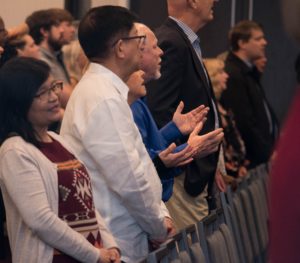GCI: Those Called Together
Here’s why each Christian needs the church — and why the church needs each Christian.
 What comes to mind when you hear the word church? Many people think of a building. The structure may be simple, or ornate. It may have stained glass windows, soaring spires or a pipe organ. Many people think of the church as a building to which worshipers come.
What comes to mind when you hear the word church? Many people think of a building. The structure may be simple, or ornate. It may have stained glass windows, soaring spires or a pipe organ. Many people think of the church as a building to which worshipers come.
The Bible, however, applies the word church, not to physical buildings, but to the worshipers themselves. The English wordchurch is a translation of the Greek word ekklesia, meaning “those called together.” It refers to Christians. They are the church; they are called together by God. Whether or not they happen to meet in a building for a worship service, they are the church 24 hours a day, seven days a week for all their Christian lives.
“Those Called Together”
The fact that ekklesia refers to believers being “called together” is instructive. Repenting, being forgiven through the sacrifice of Jesus Christ and receiving the gift of eternal life is only the beginning of the Christian calling. A conversion — a spiritual rebirth — transforms a person into a child of God. It places a person in God’s family along with many brothers and sisters who also have been born anew.
The apostle Paul wrote, “You are no longer foreigners and aliens, but fellow citizens with God’s people and members of God’s household” (Ephesians 2:19). Through conversion, a person becomes a member of the community of believers — a community known as the church.
While individual Christians are each responsible to work out their own salvation (Philippians 2:12), Christianity is not an independent way of life. Physically speaking, some Christians are geographically isolated. But spiritually, all Christians are called together and joined together. The same Spirit — the Holy Spirit – is in each of them, binding them together as one.
Although the church is not a physical structure, Paul referred to it as a spiritual building – a temple. Individual Christians are the various parts and components of this structure, “built on the foundation of the apostles and prophets, with Christ Jesus himself as the chief cornerstone. In him the whole building is joined together and rises to become a holy temple in the Lord. And in him you too are being built together to become a dwelling in which God lives by his Spirit” (Ephesians 2:20-22).
Members of a Body
| “The body is a unit, though it is made up of many parts; and though all its parts are many, they form one body.” 1 Corinthians 12:12 |
In another analogy, Paul compared the church to a human body (Ephesians 1:22-23). A healthy body functions as unit. Whatever the head determines to do, the whole body responds in harmony to accomplish. If the head decides there is a need to sit at a desk and write a letter, the entire body cooperates in the effort. One foot does not decide it would rather be taking a walk, while an arm decides it wants to play tennis.
Whatever the body does involves a group effort on the part of all its members. Paul wrote: “The body is a unit, though it is made up of many parts; and though all its parts are many, they form one body. So it is with Christ. For we were all baptized by one Spirit into one body…. Now the body is not made up of one part but of many…. Now you are the body of Christ, and each one of you is a part of it” (1 Corinthians 12:12-14, 27).
Assembling Together
As a spiritual organism, the church is Christ’s Body. It is doing what he would do if he were here in person, just as he did nearly 2,000 years ago. He preached the gospel – the good news – of salvation (Luke 4:18-19), and “he went around doing good” (Acts 10:38).
Shortly after his resurrection, Jesus gave a commission to his Body, the church. The commission is to “make disciples of all nations” (Matthew 28:19). This is a group effort. The Holy Spirit motivates each Christian to do his or her part so the Body as a whole can fulfill Jesus’ directive.


A vital part of serving and worshiping God is to take part in worship meetings. The book of Hebrews points out: “Let us not give up meeting together, as some are in the habit of doing, but let us encourage one another” (Hebrews 10:25). Worship services provide valuable opportunities for Christians to come together. As joyous celebrations of the Christian faith, these services yield many important benefits.
Worship services are occasions for the communal worship of the great Creator God and his Son, Jesus Christ. They also offer opportunities for Christians to fellowship and encourage one another. During worship services, Christians join one another in praising God in song, joyfully rehearsing what God has done and will do in our lives. They pray together, giving thanks and letting their requests be known. And they receive helpful spiritual instruction from God’s Word through sermons and Bible studies. Jesus provided that his church would have an organized ministry, including
pastors and teachers, to prepare God’s people for works of service, so that the body of Christ may be built up until we all reach unity in the faith and in the knowledge of the Son of God and become mature, attaining to the whole measure of the fullness of Christ…. We will in all things grow up into him who is the Head, that is, Christ. From him the whole body, joined and held together by every supporting ligament, grows and builds itself up in love, as each part does its work” (Ephesians 4:11-16).
Jesus emphasized the responsibility of the pastoral ministry toward other members. He compared believers to sheep and the ordained ministers to shepherds. The word pastor means herdsman or shepherd. “Feed my lambs,” Jesus told Peter (John 21:15). “Take care of my sheep,” he added (verse 16), and, “Feed my sheep” (verse 17).
Pastors serve the people of God by teaching, preaching, counseling and setting an example of Christian service. They care for each person God has called, taking seriously the admonition of Paul: “Keep watch over yourselves and all the flock of which the Holy Spirit has made you overseers. Be shepherds of the church of God, which he bought with his own blood” (Acts 20:28).
The Family of Believers
It’s not, however, just a question of how you as a Christian may benefit by assembling with other Christians to worship and fellowship. Other Christians need you. They need your prayers, for example.
Every Christian has a responsibility to pray for others. One admonition James addressed to members of the church was this: “Pray for each other” (James 5:16). How is it possible to pray for other Christians without becoming acquainted with them by means of contact and fellowship? Paul declared:
Carry each other’s burdens, “and in this way you will fulfill the law of Christ…. Let us not become weary in doing good, for at the proper time we will reap a harvest if we do not give up. Therefore, as we have opportunity, let us do good to all people, especially to those who belong to the family of believers (Galatians 6:2, 9-10).
We see that Christians are members of a closely knit family and have responsibilities to one another. Paul wrote to Christians of his day, “Encourage one another and build each other up, just as in fact you are doing” (1 Thessalonians 5:11).
All Christians are children in God’s family. When they assemble together they share experiences. They learn together. They grow together. They worship God together. They are the church of God.
